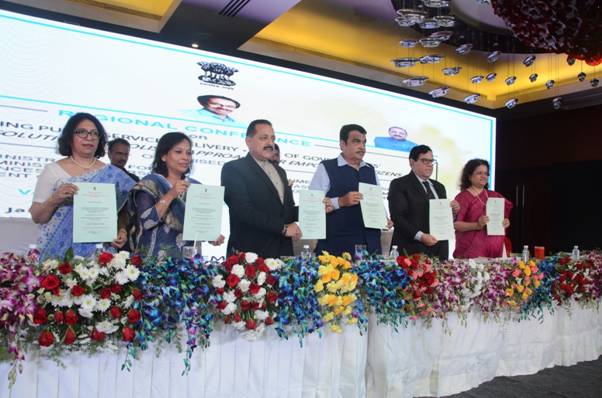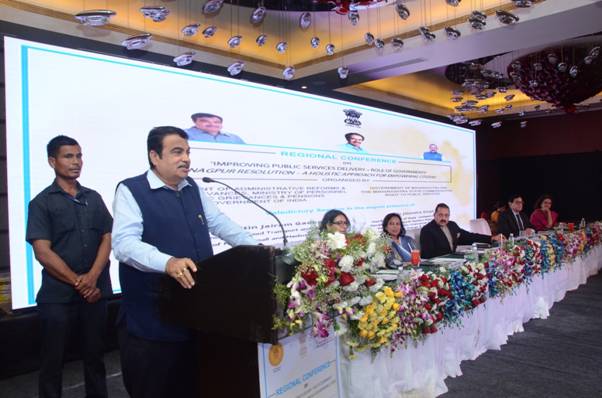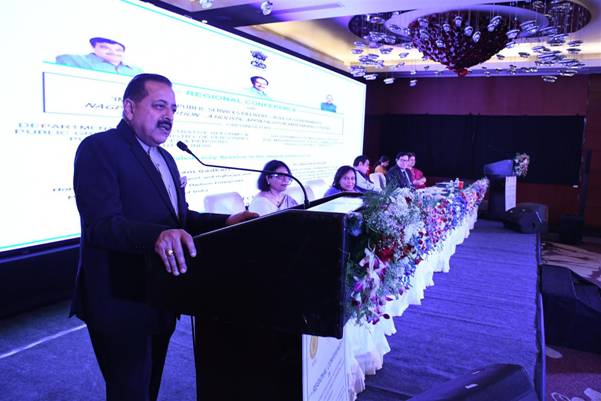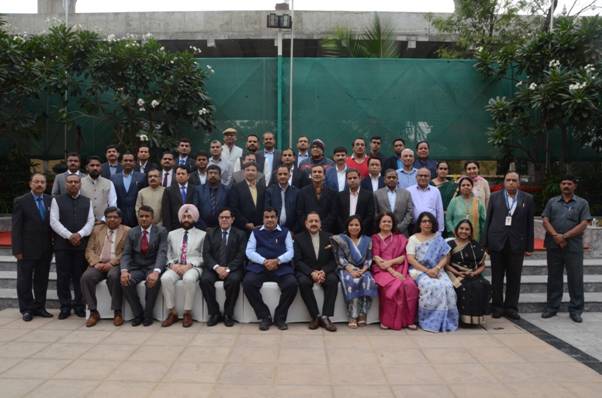‘Nagpur Resolution: A Holistic approach for empowering citizens’ adopted during regional conference organised by DARPG in Nagpur
Union Ministers Shri Nitin Gadkari and Dr Jitendra Singh address the Valedictory Session of Conference
Positive approach, transparency, corruption-free system and fast-track decision essential for good governance: Shri Nitin Gadkari
Minimum Government, Maximum Governance and citizen-centricity are mantras of Government, says Dr Jitendra Singh
The ‘Nagpur Resolution- A holistic approach for empowering citizens’ was adopted during the Valedictory session of the two-day Regional Conference on ‘Improving Public Service Delivery – Role of Governments’, in Nagpur, Maharashtra today. The Union Minister for Road Transport & Highways and Minister for Micro, Small & Medium Enterprises, Shri Nitin Jairam Gadkari and Minister of State (Independent charge) of the Ministry of DONER, Minister of State for PMO, Personnel, Public Grievances & Pensions, Atomic Energy and Space Dr Jitendra Singh were present during the adoption of the Resolution. The conference was organised by the Department of Administrative Reforms and Public Grievances (DARPG), Government of India, in collaboration with the Government of Maharashtra and the Maharashtra State Commission for Right to Public Services.

In his address, Shri Nitin Jairam Gadkari said that positive approach, transparency, corruption-free system, fast track decision making and social sensitivity are essential to good governance. He said that collective team spirit and humane approach towards the subordinates is the most important quality of the successful leaders. He said that at the same time we should understand the spirit behind the law. He emphasized upon the independent and impartial decision making within the domain of law. He added that development-orientated approach and sensitivity towards the last man in the queue are important for job satisfaction.

The Minister said that performance audit of public servants should be done at regular intervals. He said that social and national commitment are important for any civil servant. He said that administration is the strength of our country and they are important stakeholders. He added that they play the role of an engine, so their leadership role is very important. Shri Gadkari said that conversion of knowledge into wealth is the future of country. Speaking about the role of IT and e-governance in bringing transparency and efficiency in the system, Shri Gadkari said that Ministry of Road, Transport and Highways has started Fastag system at tolls. This has led to rise in per day toll collection by Rs 13 crore per day resulting into collection of Rs 81 crore per day now. This has been implemented upto 51 percent till date and will be implemented completely by next month.
Speaking about the Nagpur Resolution adopted today, Dr Jitendra Singh said that on earlier occasions also, Shillong Declaration and Jammu Resolution have been adopted for good governance. He added that soon after the formation of J&K and Ladakh as UTs, DARPG organised the conference in Jammu, which was the first major event organised by Centre Government in the UT. The conference was attended by delegates from 19 states and 7 UTs. The Minister said that Government under the leadership of Prime Minister Shri Narendra Modi is committed to the mantra of ‘Minimum Government, Maximum Governance’ since beginning. He said that the emphasis of the Government is on transparency, citizen centricity and participation. He mentioned about various initiatives taken by the Government: discontinuation of interviews for junior level posts, launching of portals, self-attestation and en-masse promotions, among others. He said that the Grievance redressal system has been made more responsive and prompt. The grievances lodged with the Government have gone up from about 1.5 lakh in the beginning to about 16 lakh now. This has been due to the prompt and time-bound response by the Government, he said. He added that telephonic feedback system has been introduced by the Department.

Dr Jitendra Singh said that the Government has started organising these conferences out of Delhi. Such conferences have been organised in Shillong, Jammu, Chandigarh and other places across the country. The Minister emphasised upon the maximum utilisation of technology in governance. He also said that the entire format of PM Excellence Awards has been changed in recent years and it is now based on implementation in priority programmes. He said the mantra of Government i.e. ‘Reform, Perform and Transform’. Mentioning about the Prevention of Corruption Act that was passed, Dr Jitendra Singh said that said that the Government is committed to zero tolerance towards corruption but shall protect the honest and sincere officers.
The Chief Commissioner, Right to Services, Maharashtra, Shri S. S. Kshatriya said that 20 states have passed the Right to Services Act. He briefed about the sessions held during the two-day conference. He said that awareness needs to be generated about the right to public services. He also emphasized upon electronic delivery and optimal utilisation of Information technology.

The conference was inaugurated yesterday and six technical sessions were held during the 2-day event.
‘Nagpur Resolution: A Holistic approach for empowering citizens’
The Conference unanimously adopted the ‘Nagpur Resolution: A Holistic Approach for Empowering Citizens’ outlined below after intensive deliberations during the sessions held over two days. The Conference resolved that Government of India, the Government of Maharashtra, the Maharashtra State Commission for Right to Public Services and the participating State Governments shall collaborate to:
- To empower the citizens by policy interventions for better service delivery through timely updation of citizens charters, implementation of enactments and benchmarking standards for continuous improvement;
- To empower citizens by adopting a bottom-up approach to bring massive improvements in quality of grievance redressal and reduction in timelines of grievance redressal;
- To adopt a holistic approach of systemic public grievance reforms through improved mapping, formulation of monitoring matrix, data collection and evaluation in quality of grievance redressal;
- To provide an enabling environment for States and Ministries/ Departments of the Government of India for creating web portals and to adopt a holistic approach for improved service delivery through digital platforms;
- To focus on dynamic policy making and strategic decisions, monitoring of implementation, appointment of key personnel, coordination and evaluation;
- To achieve a sense of common identity by exchange of technical expertise in the areas of Improved Service Delivery between the paired States under the Ek Bharat – Shresht Bharat Program;
- To work towards long-term engagements in the areas of Improved Service Delivery for Empowering Citizens through greater cooperation between the DARPG and the participating States and,
- To ensure timely publication of Good Governance Index to identify the quality of governance in 10 sectors especially those pertaining to welfare and infrastructure at the Union, State and District levels.
*********
RCJ/NK